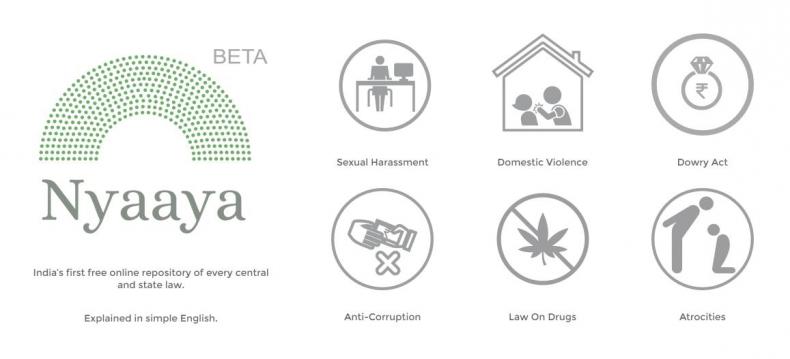
An initiative funded and conceived by philanthropist Rohini Nilekani, the wife of Infosys co-founder Nandan Nilekani, and incubated by the Vidhi Centre for Legal Policy, where she is a patron, seeks to explain all Indian laws and legal problems in easy-to-understand English.
Nyaaya.in, which launched in beta last week, is a repository of central, state and local laws taken from the statute books and simplified.
WebLLB
“It was most helpful for me to think of it as a WebMD for law,” commented Nyaaya Chief Executive Officer (CEO) Srijoni Sen, explaining about how the project started after Nilkani approached Vidhi with the idea of creating an open access Indian legal portal similar to a water portal her foundation Arghyam had previously set up.
Sen, who is a 2009 graduate of NLSIU Bangalore, said: “It has been a real need for very long and it is incredible that this did not exist already, or did not exist in a modern day format.”
“There is a lot of excellent material that people have been making but 60 per cent of the (reader base) comes from mobile (phone users). We are trying to combine both: Ease of language and also (ease of access through) a tech team constantly pushing us to think on modern ways of accessibility.”
She said usually in order to give an answer or help for a specific legal issue a lawyer would need more facts and circumstances at issue but, for example, no one thinks of WebMD com as a doctor. Similarly, for law, Nyaaya is only providing some “background information” and users should still get expert help.
It is also a resource for everyday legal issues, for example, when the police fines citizens for petty crimes or traffic violations, the amount of the fine would now be available to them in this easy to parse online database.
“We want to build easy interactive ways where you just enter the violations and your location and get an idea of the penalty. But this is still in the planning stage.”
The Nyaaya infrastructure
Currently a team of five members, including three lawyers and two IT professionals, is in charge of the project and has developed the existing content on the website with the help of 34 law students and professionals. The students were paid a small stipend from Nilekani’s funds whereas the professionals lent assistance for no remuneration, said Sen.
The team began building the content for Nyaaya in August 2016. Currently it features central laws on sexual harassment, domestic violence, the dowry act, anti-corruption, drugs, atrocities, child sexual abuse, terrorism, child marriage and prostitution.
It answers questions such as what the governing law under each head “does”, the “sort of crimes” covered under the governing law for a particular category, the forums in which citizens can enforce the law for any category, the people authorised to arrest citizens under that law, and other questions a layperson in the law may ask.
Sen explained that in the next phase Nyaaya would come out with a beta version covering the most important state level statutes, as well as rules, on the “most commonly asked (legal) questions” in the fields of family, divorce, marriage and traffic laws.
“That would be really good in the beginning and it is interesting to explore the state laws on these subjects.”
Over the coming year, Nyaaya is planning to grow to exhaustively to cover local laws, but not just in simple English, planning to expand the service in local Indian languages too, said Sen.
The Wiki model
Nyaaya would always remain a free resource for its users, and Vidhi and Nilekani did not plan to monetise it, said Sen.
“Another big part of the plan is that we slowly want to open this up to contributions while keeping an eye on quality,” she added.
She explained that Nyaaya wants to eventually function as a website modelled along the lines of Wikipedia, where any user can add or modify content, but this would be closely monitored and reviewed by an editorial team in place, before it is published on the website.
“Eventually we want to open this up and have the whole community participate,” said Sen, adding that user contributions would be duly credited on a separate page of the website.
threads most popular
thread most upvoted
comment newest
first oldest
first
threads most popular
thread most upvoted
comment newest
first oldest
first